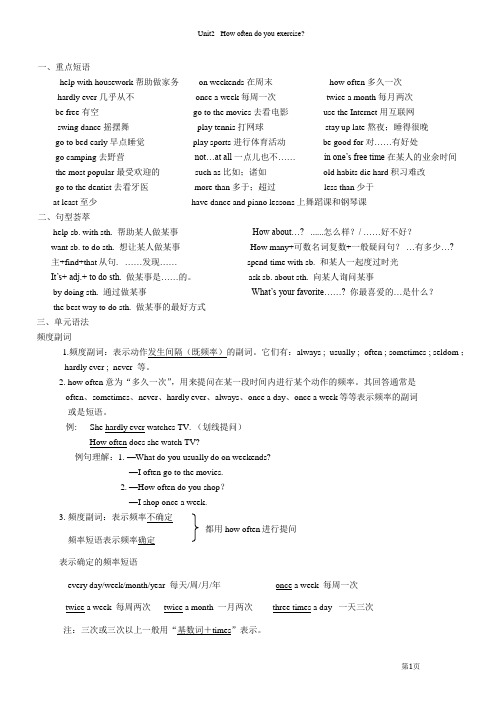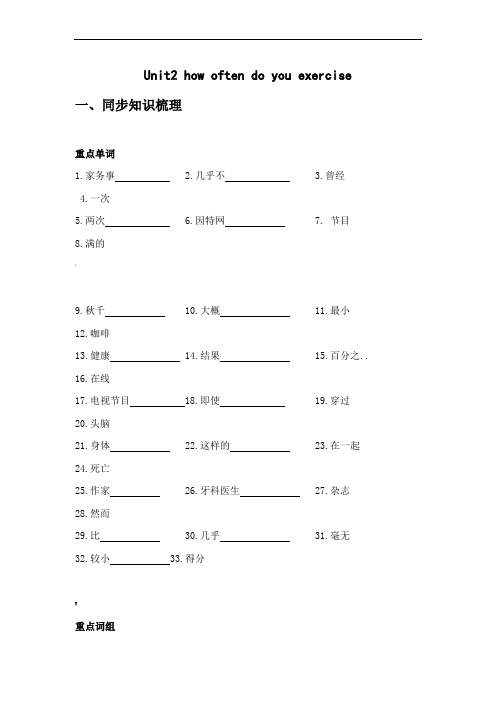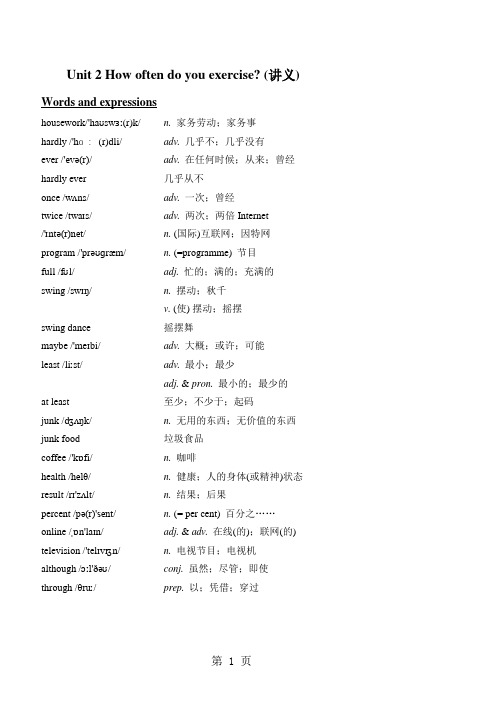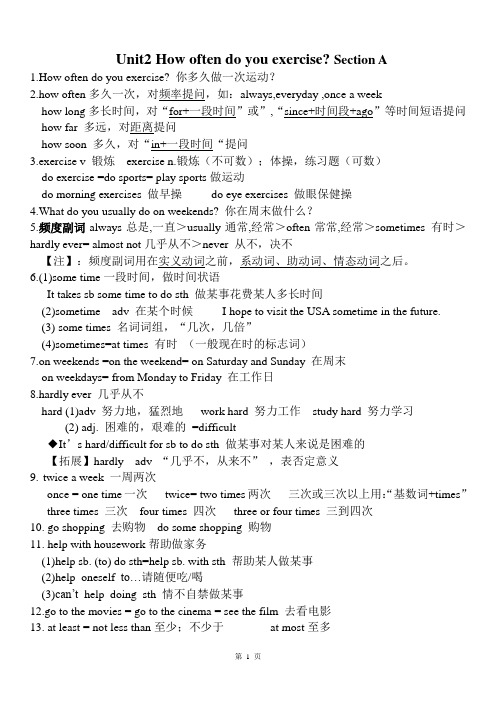Unit 2 How often do you exercise
- 格式:doc
- 大小:43.00 KB
- 文档页数:4

Unit2 How often do you exercise?知识点讲解:1.主要频率副词的等级排序:always(总是)100% > usually (通常) 70%> often(经常) 50%> sometimes(有时)20% > hardly ever(很少) 5%> never(从不)0这些副词在句子中的位置,一般放在助动词、be动词或情态动词之后,行为(实义)动词之前。
即:“行”前“助(系)”后。
提问 always, sometimes, twice a day 等频率副词,用How often拓展:some time 一段时间;sometime某时;some times许多次/倍;sometimes 有时候顺口溜:分开是一段,相逢在某时,分开S表几次,相逢S会有时2.on weekends=on the weekend 在周末3.help用法help sb. with sth. 帮助某人做某事=help sb. (to) do sth.省to不定式:“一感”feel “二听”hear,listen “三使”make, have ,let “四看”look,see,watch,notice “半帮助”help4.Go+ v- ing : 表示进行某项活动。
go swimming/ shopping/skating/skiing/fishing/climbing/hiking5. free“空闲的” be free “自由的”拓展:freedom(n) 自由“免费的”:work for free.6.full “满的;饱的” be full of=be filled with 充满...的7.what kind of dance 那种类型的舞蹈8.How about…?…怎么样?(后跟名词\代词\V-ing)(用来提出意见或征求对方建议)9. 词语词义用法答语特征how long多久询问时间多久for/about+一段时间how often多久一次询问动作的频率often, twice a week等how soon多快,过多久询问时间多快in+ 一段时间how far多远询问距离多远ten minutes’ walkhow many多少询问可数名词数量数词+可数名词复数how much多少询问不可数名词数量数词+表示量的词+不可数名词多少钱询问价格数词+钱10.have to与musthave to 必须,不得不,强调受客观条件影响而不得不去做,有人称、数和时态的变化,,变一般疑问句时借助助动词do/does/did;must 表示主观愿望和想法,没有人称、数和时态的变化,通常是指禁止... 11.want用法(1)want (sb.) to do sth.=would like (sb.) to do sth.(2)want sth.,意为“想要什么”。

一、重点短语help with housework 帮助做家务 on weekends 在周末 how often 多久一次hardly ever 几乎从不 once a week 每周一次 twice a month 每月两次be free 有空 go to the movies 去看电影 use the Internet 用互联网swing dance 摇摆舞 play tennis 打网球 stay up late 熬夜;睡得很晚go to bed early 早点睡觉 play sports 进行体育活动 be good for 对……有好处go camping 去野营not…at all一点儿也不……in one’s free time在某人的业余时间the most popular 最受欢迎的 such as 比如;诸如 old habits die hard 积习难改go to the dentist 去看牙医 more than 多于;超过 less than 少于at least 至少 have dance and piano lessons 上舞蹈课和钢琴课二、句型荟萃help sb. with sth. 帮助某人做某事How about…? ......怎么样?/ ……好不好?want sb. to do sth. 想让某人做某事 How many+可数名词复数+一般疑问句?…有多少…?主+find+that从句. ……发现…… spend time with sb. 和某人一起度过时光It’s+ adj.+ to do sth. 做某事是……的。
ask sb. about sth. 向某人询问某事by doing sth. 通过做某事What’s your favorite……?你最喜爱的…是什么?the best way to do sth. 做某事的最好方式三、单元语法频度副词1.频度副词:表示动作发生间隔(既频率)的副词。

Unit 2 How often do you exercise?内容提要:1.频度副词2.How及How短语短语引导的特殊疑问句一、频度副词➢旧知识复习1.副词:用来修饰动词、形容词、副词等的词。
2.副词的分类:副词可分为时间副词、地点副词、方式副词、程度副词、频度副词、疑问副词、关系副词、连接副词等,以下为7,8年级常见的副词。
(1)时间副词:表示动作发生的时间ago以前;now现在;today在今天;tomorrow在明天;yesterday在昨天;soon很快;just now 刚刚;then那时;finally最终;recently最近...注意:句中出现不同的时间副词,应使用相应的时态。
比较下列句子:Linda didn’t go to school yesterday.Jenny is singing now.He will e tomorrow.Tom left the classroom just now.(2)地点副词:表示动作发生的地点back在后面;everywhere到处;home在家;here这儿;there 那里;outside在外边;outdoors 在户外;indoors 在室内;down在下边;up在上边...注意:地点副词前一般不用介词比较下列句子:He went home yesterday.(home是副词,前面不用to)He went to town just now.(town是名词,前面要用介词to)(3)方式副词:表示动作发生的方式slowly 缓慢地;quickly快速地;carefully细心地;clearly清楚地;politely 有礼貌地;hard 努力地;loudly大声地...(4)程度副词:描述动作、行为或状态的程度much非常,很;little很少;very很,非常;pretty 相当,很;nearly几乎;really 真正地;enough 足够;too太;too much太多;much too 太...(5)疑问副词:主要用于引导特殊疑问句when什么时候;how怎样,如何;where在哪里;why为什么...(6)频度副词:表示事情发生的频率always总是;hardly几乎不;sometimes有时;never从不;seldom 极少;usually通常;often 经常➢随学随练1.用所给词适当形式填空,注意句中的时间副词。

Unit2 how often do you exercise一、同步知识梳理重点单词1.家务事2.几乎不3.曾经4.一次5.两次6.因特网7. 节目8.满的)9.秋千 10.大概 11.最小12.咖啡13.健康 14.结果 15.百分之..16.在线17.电视节目 18.即使 19.穿过20.头脑21.身体 22.这样的 23.在一起24.死亡25.作家 26.牙科医生 27.杂志28.然而29.比 30.几乎 31.毫无32.较小 33.得分?重点词组1.2.几乎不 2.摇摆舞3.至少4.垃圾食品5.例如6.多于7.少于重点句型1.What do you usually do on weekends;I always exercise.2.What does she do on weekendsShe sometimes goes shopping.3.How often do you you go to the moviesI go to movies maybe once a month.Section Aoften do you exercise 你多久做一次运动—【解析1】how often/ how long / how far/ how soon辨析》【解析2】exercise v 锻炼=do sports= play sports【短语】take /have/do exercise 做运动 do morning exercise 做早操 do eye exercise 做眼保健操2.3.What do you usually do on weekends 你在周末做什么【解析1】频度副词【注】:频度副词表示多长时间做某事一次, 用在实义动词之前,系动词、助动词、情态动词之后。
We often clean the classroom every day. 【拓展】some time /sometime/some times/sometimes 【口诀】:分开是一段,合起是某时; 分开s 是倍次,合起s 是某时 (1)some time 一段时间,做时间状语 ;It takes sb. some time to do sth. 做某事花费某人多长时间(2)(3)sometime adv. 在某个时候,I hope to visit the USA _____ in the future.A. sometimesB. some timesC. sometime D . some time(3) some times 名词词组,“几次,几倍” sometimes=at times 有时 (一般现在时的标志词) 【解析2】weekend/weekday 辨析 【解析】on weekends = on Saturday and Sunday 在周末on weekdays= from Monday to Friday 在工作日3. Hardly ever 几乎从不【解析】hard (1)adv 努力地,猛烈地work hard 努力工作study hard 努力学习:(2) adj. 困难的,艰难的=difficult◆It’s hard/difficult for sb. to do sth. 做某事对某人来说是困难的It’s hard for us ____________(finish) the work without other ’s help.【拓展】hardly adv “几乎不,从来不”,表否定意义,常与can ,any ,ever 连用。

Unit 2 How often do you exercise? (讲义) Words and expressionshousework/'haʊswɜː(r)k/ n. 家务劳动;家务事hardly /'hɑː(r)dli/ adv. 几乎不;几乎没有ever /'evə(r)/adv. 在任何时候;从来;曾经hardly ever 几乎从不once /wʌns/ adv. 一次;曾经twice /twaɪs/ adv. 两次;两倍 Internet/'ɪntə(r)net/n. (国际)互联网;因特网program /'prəʊɡræm/ n. (=programme) 节目full /fʊl/ adj. 忙的;满的;充满的swing /swɪŋ/n. 摆动;秋千v. (使) 摆动;摇摆swing dance 摇摆舞maybe /'meɪbi/ adv. 大概;或许;可能least /liːst/ adv. 最小;最少adj. & pron. 最小的;最少的at least 至少;不少于;起码junk /dʒʌŋk/n. 无用的东西;无价值的东西junk food 垃圾食品coffee /'kɒfi/ n. 咖啡health /helθ/n. 健康;人的身体(或精神)状态result /rɪ'zʌlt/ n. 结果;后果percent /pə(r)'sent/n. (= per cent) 百分之……online /ˌɒn'laɪn/ adj. & adv. 在线(的);联网(的) television /'telɪvɪʒn/ n. 电视节目;电视机although /ɔːl'ðəʊ/ conj. 虽然;尽管;即使through /θruː/ prep. 以;凭借;穿过mind /maɪnd/ n. 头脑;心智body /'bɒdi/ n. 身体such /sʌtʃ/ adj. & pron. 这样的;那样的;类似的such as 例如;像……这样together /tə'geðə(r)/adv. 在一起;共同die /daɪ/ v. 消失;灭亡;死亡writer /'raɪtə(r)/n. 作者;作家dentist /'dentɪst/ n. 牙科医生magazine /ˌmægə'ziːn/ n. 杂志;期刊however /haʊ'evə(r)/adv. 然而;不过than /ðæn/ prep. & conj.(用以引出比较的第二部分)比more than 多于almost /'ɔːlməʊst/ adv. 几乎;差不多none /nʌn/ pron. 没有一个;毫无less /les/ adv. 较少;较小adj. & pron. 较少的;更少的less than 少于point /pɔɪnt/ n. 得分;点Claire /kleə/克莱尔 (女名)Sue /suː/ 休 (女名)American Teenager /'tiːneɪdʒə(r)/《美国青少年》(文中为虚构的杂志名称)Role-playJack: Hi, Claire, are you free next week?Claire: Hmm…next week is quite full for me, Jack.Jack: Really? How come?Claire: I have dance and piano lessons.Jack: What kind of dance are you learning?Claire: Oh, swing dance. It’s fun! I have class once a week, every Monday. Jack: How often do you have piano lessons?Claire: Twice a week, on Wednesday and Friday.Jack: Well, how about Tuesday?Claire: Oh, I have to play tennis with my friends. But do you want to come? Jack: Sure!Grammar FocusWhat do you usually do on weekends?What do they do on weekends? What does she do on weekends? How often do you go to the movies?How often does he watch TV? Do you go shopping? I always exercise.They often help with housework. She sometimes goes shopping.I go to the movies maybe once a month.He hardly ever watches TV. No, I never go shopping.Complete the questions with do or does. Then match the questions and answers.1.How often he play soccer?2. you drink milk?3.How often they stay up late?4. Sue eat a healthy breakfast?5.How often you eat apples?6. your parents play sports? a.Yes. She usually does.b.Hardly ever. I don’t like them.c.He plays at least twice a week.d.No, they don’t. They’re too busy.e.Never. They always go to bed early.f.Yes, I do. Every day.ReadingRead the article and fill in the blanks.What do No. 5 High School Students Do in Their Free Time? Last month we asked our students about their free time activities. Our questions were about exercise, use of the Internet and watching TV. Here are the results.We found that only fifteen percent of our students exercise every day. Forty-five percent exercise four to six times a week. Twenty percent exercise only one to three times a week. And twenty percent do not exercise at all!We all know that many students often go online, but we were surprised that ninety percent of them use the Internet every day. The other ten percent use it at least three or four times a week. Most students use it for fun and not for homework.The answers to our questions about watching television were also interesting. Only two percent of the students watch TV one to three times a week. Thirteen percent watch TV four to six times a week. And eighty-five percent watch TV every day! Although many students like to watch sports, game shows are the most popular.It is good to relax by using the Internet or watching game shows, but we think the best way to relax is through exercise. It is healthy for the mind and the body. Exercise such as playing sports is fun, and you can spend time with your friends and family as you play together. And remember, “old habits die hard”. So start exercising before it’s too late! Exercise% every day% 1-3 times a week% 4-6 times a week% no exerciseUse the Internet% every day Watch TV% 1-3 times a week % every day% 3-4 times a week % 4-6 times a weekExercises一、根据句子意思及汉语提示填写单词 (每空一词)1. (虽然;尽管) she is young, she can speak English verywell.2.Everyone knows that a good eating habit is good for our(健康).3.We all know that Mo Yan is a famous (作家).4.In our class, ninetygirls.(百分之……) of the students are5.Sid is lazy, so he (几乎不) exercises.6.Let’s go (在一起;共同)!7.The meeting room is (充满的) of people.8.Please do n’t tell mom the (结果) of the test. I want togive her a surprise.9. (在线的) shopping is popular among young people.10.Her mom goes shopping (两次) a week.11.—Do you know when the sports meeting is?—I don’t know. Let’s ask the monitor. (或许) he knows.12.Be early next time. You (几乎) missed the bus.二、单项选择( )13. Helen was so excited at the news that she could say a word.A.everB. almostC. hardlyD. always( )14. —Ms. Lin is very popular among the students.—Yes. Her classes are lively (生动的) and interesting.A. sometimesB. alwaysC. hardlyD. never( )15. We play sports on school days. You know, we don’t have enough time.A. oftenB. usuallyC. hardlyD. ever( )16. —How often do you go shopping?—ever. I don’t like shopping at all.A. UsuallyB. NeverC. HardlyD. Always( )17. —How often does your sister surf the Internet?—About .A. three timeB. three timesC. every day three timeD. three times a day( )18. —How often do you drink milk?A. Less than oneB. One or two hoursC. For a long timeD. Once or twice a day( )19. I think twenty percent of the students Wang Fei’s new songs.A. likes listening toB. like to listenC. likes to listenD. like listening to( )20. he is very tired, he doesn’t stop working.A. SoB. ButC. AndD. Although ( )21. it rained hard, he still worked in the field.A. Although; andB. Although; /C. But; althoughD. Although; but三、根据提示完成句子22.我至少一周打扫一次房间。

Unit2 How often do you exercise? Section A1.How often do you exercise? 你多久做一次运动?2.how often多久一次,对频率提问,如:always,everyday ,once a weekhow long多长时间,对“for+一段时间”或”,“since+时间段+ago”等时间短语提问how far 多远,对距离提问how soon 多久,对“in+一段时间“提问3.exercise v 锻炼exercise n.锻炼(不可数);体操,练习题(可数)do exercise =do sports= play sports做运动do morning exercises 做早操do eye exercises 做眼保健操4.What do you usually do on weekends? 你在周末做什么?5.频度副词always总是,一直>usually通常,经常>often常常,经常>sometimes 有时>hardly ever= almost not几乎从不>never 从不,决不【注】:频度副词用在实义动词之前,系动词、助动词、情态动词之后。
6.(1)some time一段时间,做时间状语It takes sb some time to do sth 做某事花费某人多长时间(2)sometime adv 在某个时候I hope to visit the USA sometime in the future.(3) some times 名词词组,“几次,几倍”(4)sometimes=at times 有时(一般现在时的标志词)7.on weekends =on the weekend= on Saturday and Sunday 在周末on weekdays= from Monday to Friday 在工作日8.hardly ever 几乎从不hard (1)adv 努力地,猛烈地work hard 努力工作study hard 努力学习(2) adj. 困难的,艰难的=difficult◆It’s hard/difficult for sb to do sth 做某事对某人来说是困难的【拓展】hardly adv “几乎不,从来不”,表否定意义9.twice a week 一周两次once = one time一次twice= two times两次三次或三次以上用:“基数词+times”three times 三次four times 四次three or four times 三到四次10.go shopping 去购物do some shopping 购物11.help with housework帮助做家务(1)help sb. (to) do sth=help sb. with sth 帮助某人做某事(2)help oneself to…请随便吃/喝(3)can’t help doing sth 情不自禁做某事12.go to the movies = go to the cinema = see the film 去看电影13. at least = not less than至少;不少于at most至多14. use the Internet 上网15.What’s your favorite program?=What program do you like best?你最喜欢的节目是什么?16.every day 每天= each day 做状语,放在句末,对其提问用how ofteneveryday = daily adj. 每天的,作定语,修饰名词,放在名词之前He exercises every day. 他每天都锻炼。
八年级英语上册 Unit 2 How often do you exercise(第2课时)教学设计一. 教材分析本课时的教材是八年级英语上册Unit 2 How often do you exercise,主要讲述了频率副词的用法以及日常的锻炼活动。
本节课主要通过一个关于日常锻炼的对话来引导学生运用频率副词进行问答。
通过本节课的学习,学生能够掌握频率副词的用法,并能用英语询问和描述他人在日常生活中的锻炼习惯。
二. 学情分析学生在之前的学习中已经接触过频率副词,对本节课的内容有一定的了解。
但部分学生对频率副词的运用还不够熟练,需要在本节课中加强练习。
此外,学生还需要进一步提高用英语进行日常交流的能力。
三. 教学目标1.知识目标:–学生能够掌握频率副词的用法。
–学生能够用英语询问和描述他人在日常生活中的锻炼习惯。
2.能力目标:–学生能够熟练运用频率副词进行问答。
–学生能够用英语进行日常交流。
3.情感目标:–学生能够养成良好的锻炼习惯,提高身体素质。
四. 教学重难点1.重点:频率副词的用法。
2.难点:如何运用频率副词进行日常交流。
五. 教学方法1.情境教学法:通过设定日常锻炼的场景,让学生在实际情境中学习和运用频率副词。
2.交际法:引导学生进行角色扮演,模拟真实场景,进行英语交际。
3.任务型教学法:通过完成小组任务,激发学生的学习兴趣,提高学生的合作能力。
六. 教学准备1.教学PPT:制作包含本节课重点内容的PPT,以便进行教学展示。
2.教学素材:准备与本节课主题相关的图片、视频等教学素材。
3.小组任务:设计一个关于询问和描述日常锻炼习惯的小组任务。
七. 教学过程1.导入(5分钟)–教师通过提问方式引导学生回顾已学的频率副词。
–学生回答问题,复习频率副词的用法。
2.呈现(10分钟)–教师通过PPT展示本节课的主题:日常锻炼。
–教师呈现一组关于日常锻炼的图片,引导学生用英语描述图片内容。
3.操练(10分钟)–教师引导学生进行角色扮演,模拟真实场景,用频率副词进行问答。
Section A, 2d杰克:嗨,克莱尔,你下周有空吗?克莱尔:嗯……我下周已经安排得很满了,杰克。
杰克:是吗?怎么会呢?克莱尔:我在上舞蹈课和钢琴课。
杰克:你在学哪一种舞蹈?克莱尔:哦,摇摆舞。
它很有意思!我一周上一次课,在每周一。
杰克:你多久上一次钢琴课呢?克莱尔:一周两次,(在)周三和周五。
杰克:那么,你周二(干什么)呢?克莱尔:哦,我得跟朋友们打网球。
不过你想来吗?杰克:当然啦!Section B,2b第5中学的学生们在课余时间干什么?上个月,我们询问了我们的学生一些有关课余活动的问题。
我们的问题有关锻炼、使用网络,以及收看电视。
以下是(所获得的)结果。
我们发现我们的学生中只有百分之十五每天锻炼。
百分之四十五的学生一周锻炼四至六次。
百分之二十的学生一周只锻炼一至三次。
还有百分之二十的学生根本就不锻炼!我们都知道许多学生经常上网,但是让我们惊讶的是,有百分之九十的人每天使用网络,另外百分之十的学生每周至少使用网络三至四次。
绝大多数学生上网娱乐,并非为了做功课。
对我们提出的有关看电视的问题的回答也颇有意思。
只有百分之二的学生一周看一至三次电视,百分之十三的人一星期看四至六次电视。
另外百分之八十五的人每天都看电视!虽然许多学生喜欢观看体育节目,但游戏类节目却是最受欢迎的。
通过使用网络或观看游戏类节目来放松是件好事,但我们认为最佳的放松方式是通过锻炼。
它有益于身心的健康。
诸如参加体育运动这样的锻炼方式不但有趣,而且当你和朋友、家人一起运动时,你们还可以共度时光。
请记住:“旧习难改。
”所以赶快锻炼起来,不要等到来不及了。
Unit2 How often do you exercise? 知识点总结一、单词和短语1.How often......? 多久一次?How often 常对every day,always,usually,often,sometimes,hardly ever,never,once a week,twice 等表示频度副词或短语进行提问。
2.help v./n. 帮助A.作动词,相关短语:①.help sb. with sth. 在某方面帮助某人②. help sb. (to) do sth. 帮助某人做某事③. help oneself to sth. 请自便④.can’t help doing sth. 情不自禁做某事Eg. My brother helps me with my English. = My brother helps me learn English.我的弟弟帮我学习英语。
He can’t help crying when watching the love movie. 他看这个爱情电影时情不自禁哭了。
Please help yourself to the drinks. 请自取饮料酒水。
3.4.5.频度副词频率排序:always>almost always>usually>often>sometimes>seldom>hardly ever>almost never>never6.once 副词,一次;曾经;一旦A.作副词,意为“一次”,表示频率,常用来回答how often的提问。
Eg. —How often do you go shopping? —Once a week.B.作副词,意为“曾经”,表时间,常与一般过去时连用。
Eg. He once lived in Beijing,China. 他曾经住在中国北京。
Unit 2 How often do you exercise?一、词型转换Section A1. ever → (反义词) never2. shop → (现在分词) shopping3. full → (反义词) empty4. read → (pt.) readSection B1. active →(v.)act → (n.) activity2. health → (adj.) healthy → (反义词) unhealthy3. body → (pl.) bo dies4. die → (pt.) died5. write → (n.表人) writer6. keep → (pt.) kept → (pp.) kept7. little → (比较级) less→ (最高级) least 8. though → (同义词) although二、短语归纳Section A1. how often 多久一次2. read English books 看英语书3. of course 当然4. on weekends 在周末5. go to the movies 去看电影6. hardly ever 几乎不;不曾7. every day 每天once a day 每天一次8. twice a week 每周两次three times a month 每月三次9. use the Internet 上网10. have dance and piano lessons 上舞蹈和钢琴课11. play tennis 打网球12. help with housework 帮忙做家务13. at least 至少,不少于Section B1. junk food 垃圾食品2. drink milk 喝牛奶3. three or four times a week 一周三到四次4. eat fruit 吃水果5. want sb. to do sth. 想要某人做某事6. be good/bad for 对……有好处/坏处7. go camping in the country 去乡下露营8. play sports 做运动9. one to three times a week 一周一至三次10. such as 例如11. fifteen percent of our students 我们百分之十五的学生12. go to the dentist 去看牙医13. more than 多于14. less than 少于重点句子1. how often do you exercise? 你多久锻炼一次2. —What do you usually do on weekends? —周末你通常干什么?—I usually play soccer. —我通常踢足球。
3. Sh e says it’s good for my health.她说这对我的健康有好处。
4. How many hours do you sleep every night? 你每天晚上睡多少个小时?5. And twenty percent do not exercise at all! 并且百分之二十的学生根本不运动!6. The answers to our questions about watching television was also interesting.对于我们看电视这个问题的回答也很有趣。
7. It is good to relax by using the Internet or watching game shows, but we think the best way to relax is through exercise.通过上网或看娱乐节目放松是好的,但是我们认为最好的放松方式是通过锻炼。
8. It is healthy for the mind and the body. 它对于大脑和身体是健康的。
合作探究一、难点讲练•讲一讲1•How often do you exercise?你多久锻炼一次?(1)“how often”是对表示频度的时间状语的提问,可翻译为“多久(一次)”。
例如:How often do you watch TV? 你多久看一次电视?【拓展】与how有关的短语:how far(距离)多远;how long(时间)多长;how many多少(只可接可数名词的复数形式);how much多少(只可接不可数名词);how soon(时间)多久后(事情还要过多久才发生);how old(年龄)多大。
(2)exercise做动词时,可作及物动词,也可作不及物动词。
例如:She exercises two or three times a week. 她一周锻炼两三次。
She exercises the dog every day. 每天她都遛狗。
【拓展】exercise作名词时,意为“锻炼;运动”时是不可数名词,意为“体操;练习”时是可数名词。
例如:I should eat less food and take more exercise. 我应该少吃饭,多锻炼。
We do morning exercise every morning. 我们每天早上都晨练。
•练一练1•1. She often goes to the movies twice a week.(对划线部分提问)________ ________ ________she ________ to the movies?2. —______ is Lucky 52 shown on CCTV-2?—Every week.A. How longB. How oftenC. How soonD. How many times3. There are 35 boys in our class. (对划线部分提问)________ ________ boys are there in your class?4. ________ (exercise) helps us keep healthy.(用所给词的正确形式填空)5. We do ________ ________(眼保健操) every day.•讲一讲2•But my mother wants me to drink it. She says it’s good for my health.但是我妈妈要我喝。
她说牛奶对我的健康有好处。
(1) want为及物动词,意为“想要”,其后接名词或动词不定式,相当于would like, 但would like 的语气更为委婉。
want的用法如下:用法意义例句want sth. 想要某物 I want a new pen.我想要一支新钢笔。
want to do sth. 想要做某事 I want to go to the library.我想去图书馆。
want sb.(not)to do sth. (不)想要某人做某事 He wants me to play basketball with him.他想让我陪他打篮球。
(2)be good for 意为“对……有益”,其反义词组为be bad for, 意为“对……有害”。
例如:Eating to o much meat isn’t good for you.吃太多肉对你并没有好处。
Smoking is bad for your health. 吸烟有害健康。
【拓展】be good to 对……友好(和善),be good at擅长,善于•练一练2•6. My parents want me ________ (study) hard.(用所给词的适当形式填空)7. His mother wants him ________ at home today.A. staysB. stayedC. to stayD. staying8. Tom wants to watch TV.(同义句转换)•讲一讲3•It is good to relax by using the Internet or watching game shows, but we think the best way to relax is through exercise.通过上网或看娱乐节目放松是好的,但是我们认为最好的放松方式是通过锻炼。
(1)It’s good to do sth. 意为“做某事好”,它是“It’s+adj.+to do sth.”句型的一种形式,it作形式主语,to do sth.是真正的主语。
例如:It’s good to run in the morning. 早上跑步是好的。
(2) the best way to do sth.意为“做某事最好的方法”,其中to do sth.是动词不定式作后置定语,也可表达为the best way of doing sth.例如:I have a good way to do with the problem. 我有一个处理这个问题的好方法。
(3) by using the Internet or watching game shows,其中by作介词,表示“通过某种方式”。
置于动名词前表示方法、手段、原因等。
例如:By working hard he made great progress. 通过努力学习,他取得了很大的进步。
He earns his living by writing. 他靠写作为生。
•练一练3•9. It is very important for us ________ English well.A. learnB. learningC. to learnD. learned10. it’s very nice ________ you ________my parents y our best wishes.A. of, sendingB. of, to sendC. for, to sendD. for, sending11. —I often have hamburgers for lunch.—You’d better not. It’s bad for you ________ too much junk food.A. eatB. to eatC. eatingD. ate12. The best time ________(visit) Beijing is in autumn.(用所给词的正确形式填空)•讲一讲4•I go to the movies maybe once a month. 我大概一个月去看一次电影。